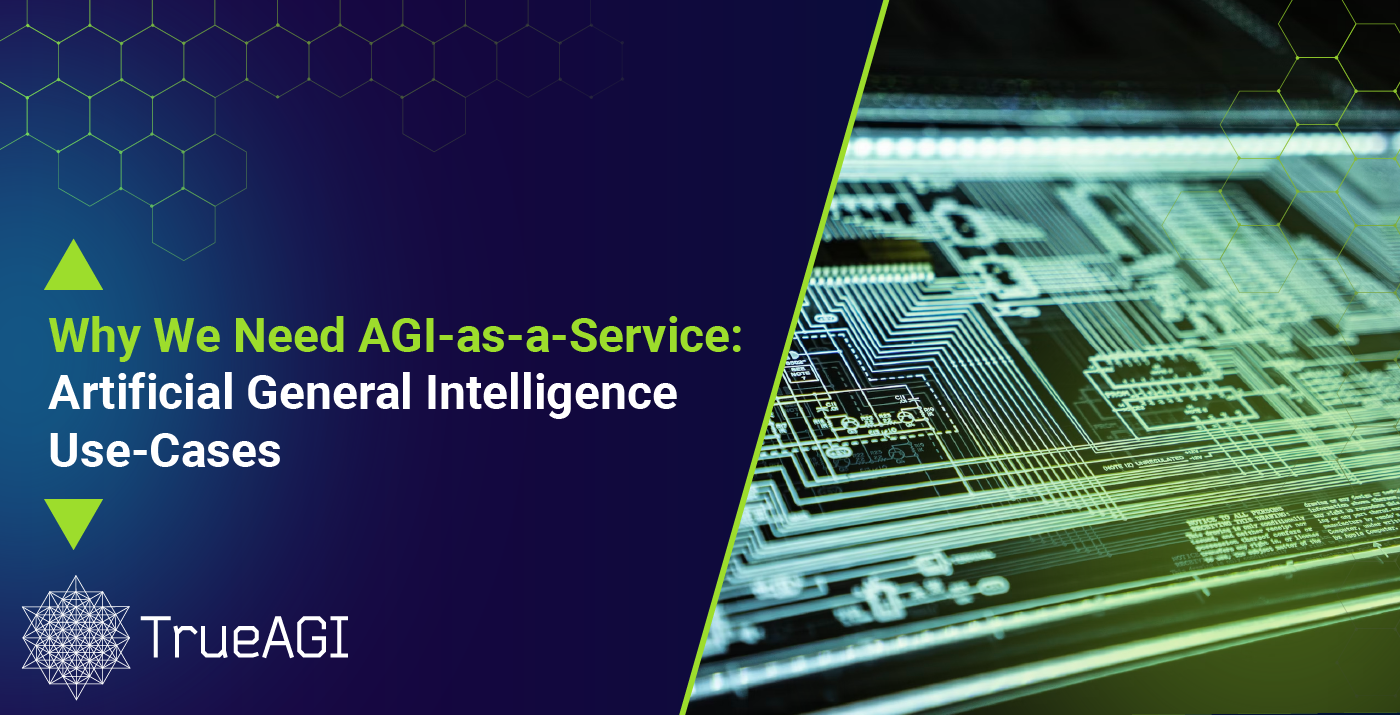
Potential AGI Applications That Can Revolutionize Human Life
Technology is often the consequence of human necessity.
However, every once in a while, a technological achievement is so significant and revolutionary that it changes the paradigm—it transcends the state of a solution to a specific problem, and becomes the status quo.
These technologies take root so deep in our way of life that we cannot even remember how we used to do things before. Some examples of this are electricity or the internet—developments we have built our entire way of life around.
In that regard, artificial general intelligence is on the path to become one of these paradigm-changing solutions. In this article, we’ll explain how.
What is Artificial General Intelligence?
Artificial General Intelligence (AGI) is a branch of artificial intelligence that aims to develop computers capable of performing intellectual and cognitive tasks like the human brain does, such as reasoning, inference, and empirical learning.
Nevertheless, AGI is a complex field that requires developing advanced algorithms, models, and systems that can learn, reason, and adapt to different circumstances which, as you can imagine, is not easy to do. This is why AGI is still in an exploratory stage and has not yet been achieved.
Why is it important, then? The potential benefits of AGI are vast at the civilization level. Thus, an AGI-as-a-Service solution could revolutionize the way we interact with technology, not only within the consumer economy, but changing our entire way of life for the better.
Exploring the Potential of AGI-as-a-Service Across Different Industries
The modern world is mostly data-driven, especially in the business and industrial spheres. Organizations often base their decisions on enormous data sets collected from thousands to millions of customers to improve their services and offer better solutions.
However, the human brain is not particularly good at processing data. What makes it unique is its creativity and ability to reconfigure itself according to the circumstances—we refer to this concept as neural plasticity.
Now, an AGI-as-a-Service solution could unlock the best of both worlds: powerful machine learning algorithms that can analyze large amounts of data, recognize patterns, and make predictions with high accuracy; and the ability to interpret these patterns to create original solutions to real-world problems—all this in automated, efficient, and economically competitive manner.
AGI Solutions for Healthcare
Many of the limitations we face today in the medical field derive from human error. Medical professionals have to rely on their own experience, intuition, and judgment when making diagnoses and developing treatment plans.
Yet, as we mentioned before, the human brain is not the best at data processing—it often forgets or overlooks critical information or misinterprets a particular set of data. This can lead to inaccurate diagnoses or inadequate therapies and treatments.
In that scenario, AGI can combine the human brain’s creativity and ability to infer from pre-existing knowledge and observation with a computer’s unmatched processing speed and data storage.
Furthermore, a customized AGI-as-a-service solution would enable healthcare institutions to equip this technology, easily integrating it into their processes to assist their medical personnel..
This would significantly reduce human error and enhance healthcare outcomes by allowing for more accurate diagnosis and treatment recommendations, improving illness discovery and treatment, and, perhaps most crucially, delivering healthcare to underserved areas.
Even more so, medical research and drug discovery could be significantly improved by AGI as well. By observing the results of clinical trials and drug interactions, we could leverage the power of artificial general intelligence to develop more effective drugs and discover insights that could lead to new medical breakthroughs.
AGI Solutions for Finance
Finance is arguably one of the most sensitive sectors when it comes to business: managing other people’s funds is not something to be taken lightly.
Financial applications need an extra layer of security, integrity, risk-management, and transparency to make sure that users are protected and can see exactly how their assets are being managed. There’s no room for negligence.
In that scenario, AGI solutions have the potential to improve decision-making, reduce costs, and increase capital and budget efficiency and security on multiple levels.
For starters, pattern recognition is one of artificial intelligence’s greatest strengths. This is particularly valuable in the financial sector for fraud detection and prevention.
Financial institutions can use AGI algorithms to analyze enormous volumes of data from many sources in order to find patterns that suggest fraudulent activity. Then, using historical data, they could identify new types of fraud and continuously increase their accuracy.
The same mechanism could be used for identifying investment opportunities. Expert traders generally make decisions based on data analysis and observing patterns in price charts.
AGI algorithms can examine financial data such as market patterns, stock prices, and company news to make investing decisions in the same way that expert traders do, albeit at a considerably faster rate. Not only that, but it can also consider external circumstances like current events and trends, seasonal and climate factors, political issues, and so on.
In this regard, an AGI-as-a-service solution could be extremely beneficial for financial service providers, enabling their systems to enforce highly efficient security measures and offer their customers enhanced tools to find the best opportunities, minimize risks, and maximize revenue.
AGI Solutions for Gaming
The gaming industry uses artificial intelligence on a daily basis. When you play a video game, every non-playable character (NPC) is essentially an AI, from those walking around to make the world feel more alive to the enemies that constantly attack you as you progress.
However, the models used to “command” these NPCs are extremely basic and narrow stimulus-response systems which can often break immersion and ruin the experience.
By granting NPCs with real intelligence, game developers could also create enemies that learn from the player’s combat style, becoming harder and harder to beat as you progress through the game.
Another non-combat application would be smart NPCs. Picture this scenario: You’re playing a medieval role-playing game in which, when you reach a certain level, you become a knight and get your own esquire. Then, you could command them to perform certain tasks or actions, like fetching a specific in-game item.
Naturally, these are only examples. The possibilities of granting real intelligence to NPCs are only limited by the developer’s creativity..
In this regard, TrueAGI has built an artificial intelligence agent capable of understanding its surroundings and performing reasoning processes to achieve a goal. This exact model was deployed on a Minecraft environment and managed to successfully find diamonds.
AGI Solutions for Environmental Protection
Climate change and environmental protection have become a critical issue for humanity as a whole.
While it’s encouraging to see people and industries alike becoming more conscientious about this issue and making active efforts to protect the planet—such as prioritizing renewable sources of energy, reducing water and electricity consumption, and recycling—we will need more creative solutions to tackle the problem in the long term. And AGI can help us find them.
How so, exactly? On one hand, AGI can enhance environmental monitoring by analyzing massive amounts of data from environmental sensors, satellites, and other sources. Then, it can detect patterns, identify anomalies, and provide real-time insights into environmental conditions that help us address potential climate crises even before they happen.
For example, we can train AGI models to analyze satellite imagery to track deforestation, monitor changes in land use, or identify endangered species habitats. This data-driven approach enables proactive decision-making and efficient resource allocation for environmental conservation.
Of course, avoiding large-scale climate crises is critical, but not the only aspect we need to tackle. Resource management is also fundamental to promote sustainability, and AGI can help here as well.
In this regard, artificial general intelligence algorithms can track energy consumption patterns and identify opportunities for energy efficiency improvements in industries, buildings, or transportation systems. Another possibility would be optimizing water resource management by observing consumption patterns and seasonal data to predict shortages and suggest conservation strategies. This would be particularly helpful in agriculture and farming, which use massive amounts of water and chemicals for irrigation, fertilization, and pest management.
In general, AGI-powered systems can dynamically allocate resources and optimize operations in real-time, not only maximizing efficiency and promoting sustainable practices across various sectors, but also preventing significant financial losses due to waste.
Challenges of Massively Accessible AGI
As described throughout this article, an AGI-as-a-Service offering and business model would provide several advantages and benefits across multiple industries.
Firstly, it would allow businesses to integrate powerful machine learning and artificial intelligence algorithms and models into their processes, in turn enabling them to maximize efficiency, reduce costs, and unlock greater flexibility and scalability.
However, the technology isn’t quite there yet, and there are several challenges that must be addressed when developing an AGI-as-a-Service solution.
AGI is a complex and constantly evolving field of study, and developing a scalable and reliable AGI system for the long run is a significant challenge. It requires significant investment in research and development to ensure accuracy, reliability, and security.
Secondly, AGI systems must be developed with ethical considerations in mind. There are concerns about the potential impact of AGI on employment, privacy, and security, and these issues must be carefully considered when developing an AGI-as-a-Service solution.
In that scenario, TrueAGI is proud to be pioneering the development of this kind of services while tackling the current challenges of the industry.
The company has allocated ample resources in developing next-generation systems and infrastructure composed of the most advanced AGI technologies to date. This will allow TrueAGI to create artificial general intelligence solutions tailored for each activity, organization, and industry.
As a civilization, we have historically developed technologies as a response to our necessities, and AGI will be the greatest accomplishment to date—systems so advanced that can tackle multiple global-scale problems at once, collaborating with and supporting humanity to bring the next era of abundance and sustainability upon us.

Subscribe to our Newsletter
Email Address